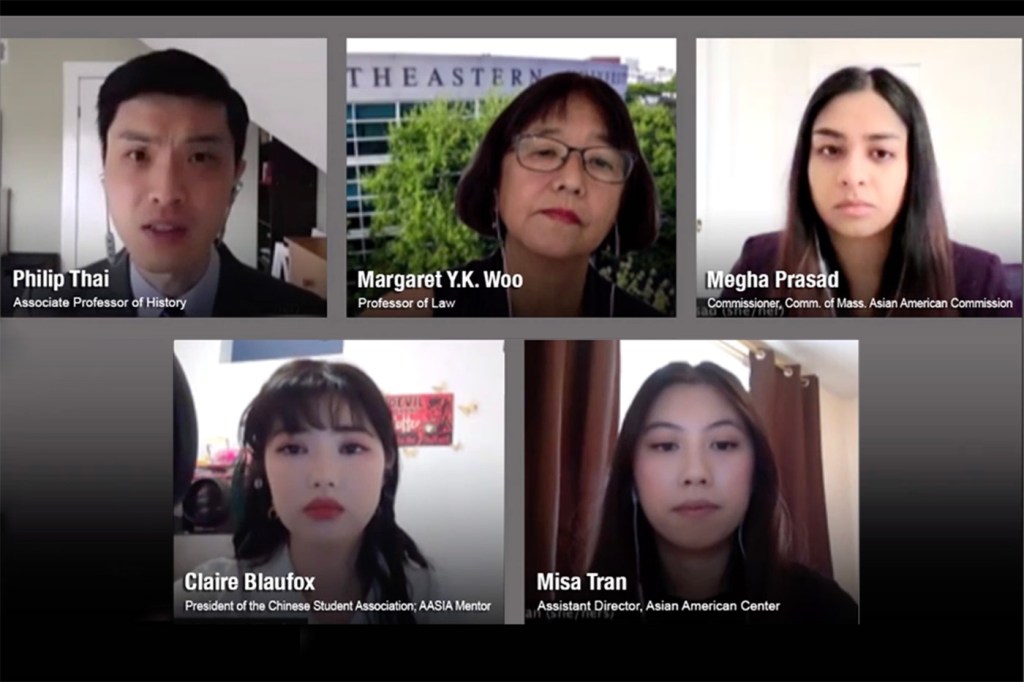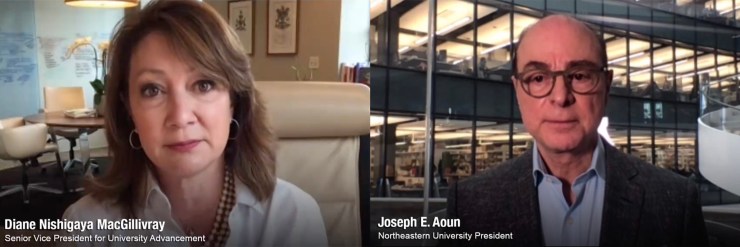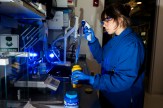Northeastern president Joseph E. Aoun pledges action plan following rise of anti-Asian bias in the US

In an event Monday held in response to a spate of anti-Asian racism and violence in the U.S., Joseph E. Aoun, president of Northeastern, called upon university officials to create a “comprehensive action plan” by the end of May to address ways in which Northeastern can better support its students and community.
Aoun tapped two senior university administrators to “look at what the university can do better,” he said: Karl Reid, senior vice provost and chief inclusion officer, and Ken Henderson, chancellor and senior vice president for learning.
“For some of you, it hasn’t been easy,” Aoun said during the event, titled “Standing Against Hate: A Time to Reflect, Act, and Show Solidarity.” “You shared your own experiences, and you shared your own journeys. The purpose of this dialogue is to empower people to speak, but also to act collectively, individually, and institutionally.”

Screenshot by Northeastern University
The event featured conversations among students, faculty, and staff who called for action and shared personal experiences as members of the Asian, Asian American, and Pacific Island community.
Diane N. MacGillivray, senior vice president for university advancement, shared her experience growing up as a Japanese American woman who often had to tease apart pieces of her family history to understand her own.
“I’m here with you not as an administrator, not as an expert in diversity, equity, and inclusion, not a specialist in the Asian American, Pacific Islander community—I’m here with you today simply as Diane. Diane Nishigaya,” she said, using her maiden name.
MacGillivray acknowledged the ways in which members of the Northeastern community and society at large are “united in grief, fear, exhaustion, and yes, in anger at the escalating hate and violence directed toward us,” but added that she has hope for a more tolerant future.
“You cannot work on a college campus and be a cynic when you see the energy, the commitment, and the determination of our students to make positive change in the world,” MacGillivray said.
Northeastern’s event was held on the heels of a wave of anti-Asian violence in the U.S. At the end of March, a man opened fire in three spas in Atlanta, killing eight people. Six of them were women of Asian descent. Investigators have not ruled out bias as a motivation, according to recent media reports.
The shooting punctuated a year during which anti-Asian harassment and bias has been steadily climbing in the country, stoked by the use of racist language by the former Trump administration to describe COVID-19, a disease which public health officials believe to have originated in Wuhan, China.
“The recent events have been painful, to say the very least,” said Chong Kim-Wong, vice chancellor for student success at Northeastern, and one of the speakers on Monday. Kim-Wong, whose family emigrated from South Korea when she was 7 years old, said her “identity as a Korean American woman is core to who I am.”
Margaret Y.K. Woo, a professor of law at Northeastern who participated in a panel discussion moderated by associate history professor Philip Thai on Monday, emphasized the importance of bystander intervention and said she had experienced firsthand the importance of having people nearby to help when harassment occurs.
“I was accosted around Jamaica Pond,” Woo said, referring to a popular park in Boston’s Jamaica Plain neighborhood. “What made it easier was that there was someone there who stepped up to me and asked if I wanted them to come with me to the police station to file a report” and offered to help in other ways, she said.
“We, as Asian Americans, and those who are not Asian Americans need to continue to speak up and have honest conversations about anti-Asian violence and racism,” said Woo, who sits on the board of directors of the Asian American Legal Defense and Education Fund. “The time for invisibility is gone. We are in a critical moment where we need to continue to speak up.”
Two students spoke during the event of their commitment and determination.
Claire Blaufox, a third-year chemical engineering student and president of the Northeastern University Chinese Student Association, and Megha Prasad, a second-year student of political science and the youngest commissioner sworn into the Commonwealth of Massachusetts Asian American Commission, both called upon the university to enrich its offerings for cultural competency.
Blaufox advocated that the university should require ethnic studies courses and provide mental health resources for students that accounts for the specific needs of their various identities, as well as mandate ethnic training courses for faculty and staff.
“We’re advocating for the shaping of society,” she said. “We feel that Northeastern should be a model of what society needs to be.”
Prasad added that it was crucial to “have a campus community that is racially literate enough that students, faculty, and staff can have conversations and understand each other.”
Both Blaufox and Prasad said Northeastern’s Asian American Center has served as a safe space for them to connect with other students and provided a sounding board for recent events in the U.S.
Misa Tran, assistant director at the center and another speaker at Monday’s event, outlined some of the organization’s signature programs, including Asian American Students in Action, a mentoring program; Asian American heritage month; the Pan Asian American Council; and the Pan Asian American Queer Alliance.
“Right now, there is an urgency to act but also a need to heal,” Tran said. “The need for care is crucial, and we hope the university can help sustain our work at the Asian American Center and our love for students.”
For media inquiries, please contact media@northeastern.edu.





